It's been the longest martial law period for any area in Mindanao in more than 3 decades. How are local executives and civilians coping?
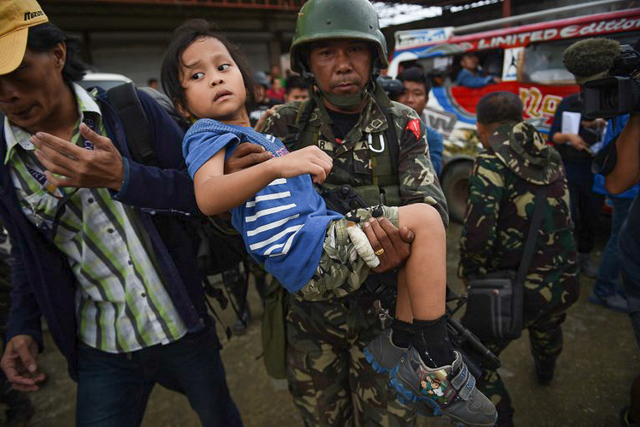
RESCUING CIVILIANS. A soldier carries a child during rescue and evacuation operations in Marawi on May 31, 2017. Photo by Ted Aljibe/AFP
Dr. Shalimar Rakiin, the chief health officer of Lanao del Sur, is a woman with a mission when she visited the capitol here in late July.
She needed the military to let her staff through city checkpoints to fast-track the delivery of health services here and in nearby towns cut off by war.
Under martial law in a city torn apart by war, she and other health workers wait hours at checkpoints even as they navigate the mistrust of some soldiers toward them. “Sana kapag dadaan kami sa checkpoints, hindi ganoon katagal. In the past, we have experienced na naka-hold kami ng one hour or two hours (We hope they won’t hold us for too long in checkpoints. We had previous experiences when we were held for one to two hours),” she lamented.
“Nakaka-hurt din na nagtratrabaho kami pero minsan mayroon silang suspicion that we are treating the enemies (It also hurts us to hear that they suspect us of treating the enemies),” Rakiin added.
Rakiin said she understands the strict security measures are also for their own good, so they don’t get in danger while performing their duties. But she hopes for a better system to make sure health services are not delayed.
“We have raised these issues in so many venues with meetings with the Army. They are trying to address these,” she said.
She did succeed in getting security passes for her staff on July 25, but under strict conditions. The military also assured her that troops have been “oriented to be courteous.”
Necessary hassle?
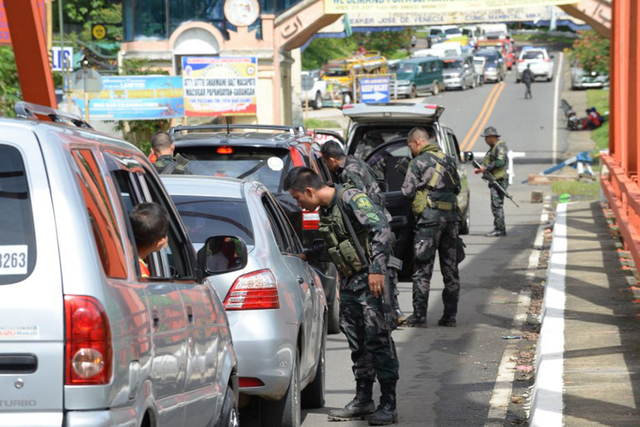
MARTIAL LAW. Police special forces inspect vehicles at a checkpoint near the entrance to Marawi. Photo by Ted Aljibe/AFP
It is in Marawi where martial law, implemented last May 23 throughout Mindanao, is most felt. ISIS-inspired local terrorists remain in control of 3 villages here, in a war of attrition that has displaced 400,000 residents of the city and nearby areas and killed more than 500 troops, terrorists and civilians. (WATCH: The battle for Marawi's bridges)
Run for decades by political families with their own private armies, Marawi is now under full military control. Beyond imposing curfews, soldiers have the last say on where people could go, what they can do, and when they're allowed to do it.
Captain Jo-ann Petinglay, the military spokesman in Marawi, said it is important that movements inside the city are strictly monitored to secure the safety of civilians, prevent entry of men who could reinforce the terrorists, and stop fighters from escaping the battle area.
“They have to inform us ano ang lakad nila (what their activities are). If there’s no need for them to have uniformed troops during their operations, hindi naman kailangan (we don’t need to escort them). If there’s a need, we provide them with troops,” Petinglay said. (READ: Snipers and IEDs: Deadly combination in Marawi war zone)
Vice Governor Mamintal Adiong Jr said it’s a necessary inconvenience. He said local officials welcomed the extension of martial law, acknowledging that the LGU still needs the military to control the security situation in the city.
“Nakakasagabal talaga. Pero gusto rin natin walang mangyari. Walang makapasok kasi iilan lang ang kilala natin sa kanila (It’s an inconvenience. But we also don’t want anything untoward to happen. We have to make sure enemies do not get to enter the city. We don’t know who they are),” Adiong said.
Coming home
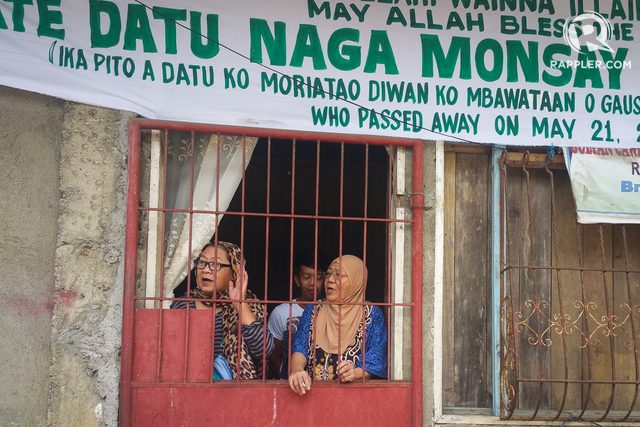
TRAPPED. Residents who can’t or won’t leave Marawi City are asking for food and water from the government. Photo by Bobby Lagsa/Rappler
Most of Marawi residents evacuated the city on the first week of the war. The military was focused at that point on massive and intense attacks and rescuing civilians trapped in the war zone.
Only reinforcing troops and journalists, who were screened and given security passes, were allowed to enter the city.
Weeks passed and other concerns cropped up. Village (barangay) officials trooped to the capitol asking to regain access to their areas as allegations of looting against the military emerged.
The military in turn blamed the terrorists for looting. Troops escorted village officials to check and lock homes as residents of the so-called safe zone – areas untouched by clashes – demanded to go back to their homes.
It’s a call that grows louder by the day as the military fails to offer a timeline for their return. (READ: Marawi residents beg Duterte: End war, martial law now)
“Gusto ko lang ipaintindi sa mga kababayan ko. Hindi dahil sinabing cleared ay pwede na na tumira (I want the people to understand. Just because villages are cleared of terrorist presence doesn’t mean it is safe to go back),” Aidong said.
He cited the stray bullets that rain on the capitol when fighting gets intense.
The military said it needs to complete 4 stages of clearing operations – making sure the areas are cleared of terrorist presence, improvised explosive devices, dead bodies, and viruses.
Critical agencies: DOH, DSWD, DPWH, and DTI
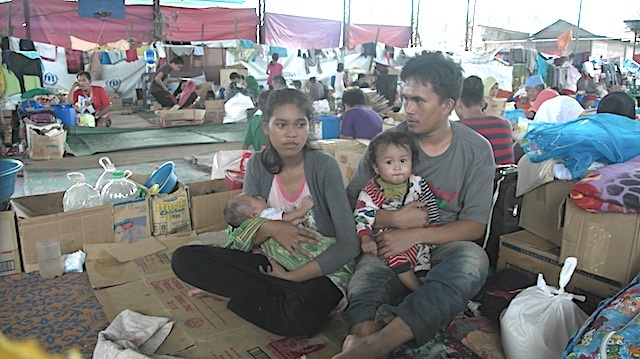
TEENAGE MOM. Ina Daro was 8 months pregnant when the war erupted on May 23. She gave birth at the evacuation center. Photo by Adrian Portugal/Rappler
Despite the restrictions, Adiong said there is good coordination between the military and local government officials.
The capitol in Marawi serves as the operations center of the Provincial Crisis Management Committee because no work can be done at the city hall that is too near the battle area.
Only up to 20% of employees report to the capitol in Marawi. The rest of the work is done in offices located in the safety of Iligan City. Mayor Majul Gandamra also transacts business at the Capitol.
Adiong said the 4 most critical agencies are operating in Lanao del Sur:
Department of Social Welfare and Development (DSWD)
Department of Health (DOH)
Department of Public Works and Highways (DPWH)
Department of Trade and Industry (DTI)
All agencies are operating in close coordination with the military.
The DSWD is most important because it is on top of providing services to evacuees that have reached nearly 400,000 – double the population of Marawi – because residents of adjacent towns also evacuated.
Adiong said the national office has shouldered the heavy cost of feeding the evacuees every day for the past two months, a financial burden that he said the LGUs cannot afford.
The DOH takes care of the health concerns not only in evacuation centers but also in the rest of the province. “We told our health officials that they should be visible,” said Rakiin.
The DPWH is critical in making sure that roads are open to make sure that no area is cut off from relief goods and basic commodities. Adiong said they are opening new routes so that towns adjacent to Marawi also get aid.
The DTI is also necessary to make sure that commodity prices are stable. Adiong said a sack of rice reached as high as P6,000 at the height of the clashes. He said he's asked DTI to deploy rolling stores to put prices are under control.
Marawi’s western half
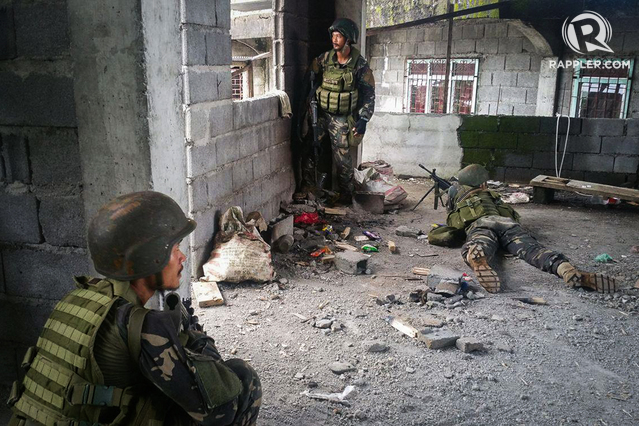
CLEARING OPERATIONS. Goverment troops go house to house, street to street, to clear Marawi of terrorists. Photo by Bobby Lagsa/Rappler
As the war persists on its 3rd month and now confined to just a few villages, the military is forced to relax its rules. They also started issuing security passes for government officials and residents.
Petinglay said they make leeway for residents who, for example, need to go back to their homes to get documents such as passports.
“We allow at least two people coming in. These documents are important, especially for our Muslim brothers, who will go to Mecca before the Haj. They need their passports so we allow it,” Petinglay said.
Government employees and residents applying for security passes packed the capitol. They also included residents who stayed in Marawi despite the clashes, who now want passes to travel to Iligan City to buy supplies for their families.
Petinglay said the situation of residents who stayed in Marawi is a problem that continues to challenge them. "They are airing their grievances also because the roads are blocked. They don't have food supply. In coordination with other government agencies, we provide them with goods and allow them access to the city," Petinglay said.
5 more months
Adiong said they are pushing the military to bring back normalcy as soon as possible in the western half of Marawi City, which is largely untouched by the clashes, particularly the areas that are safe from stray bullets.
“Ang gusto lang natin ipaintindi sa military, dapat may coordination itong mga ito tulad ng government employees. Dapat talaga para may semblance of normalcy kahit sa kalahati ng Marawi City. Marami nagrereklamo na (We want the miiltary to understand that there has to be better coordination with government employees. There really should be a semblance of normalcy even only at the other half of Marawi City. A lot of people are already complaining),” Adiong said.
Outside the city, the situation is slowing improving. The military is turning over security operations to the civilian Barangay Peacekeeping Action Teams (BPATs), said Adiong.
LGUs are also encouraging residents of towns adjacent to Marawi to return to their homes to help declog the evacuation centers in Iligan City and the towns of Sagurian and Balo-i.
On July 26, provincial government officials were also allowed to pass through checkpoints in Marawi City to deliver relief goods to a town that previusly took 4 hours to reach because vehicles had to go around the lake.
This is the same route the accredited DOH employees are now allowed to take to reach patients in those towns.
Journalists are banned from taking this shortcut that reportedly passes near the war zone. Mobile phones and cameras of local officials are also confiscated during the trip.
Adiong said they supported the extension of martial law, although they thought it was only for another 60 days and not 5 months – or up to December 31 – as approved by Congress .
But Adiong said he is not worried. “Ang nakita ko kasi magkaiba ang martial law noong time ni Marcos (I can see that this is a different martial law from the time of Marcos)."
He recalled how as a young boy, a Grade 1 pupil, soldiers singled him out because of his family name. “Naranasan ko kasi na pinag-ihaw ako ng mais ng mga sundalo. Tinanong kami sino ang Alonto. Ako naman, bata, sabi ko: ‘Ako si Mamintal Alonto Adiong Jr. Pinababa ako. Mag-ihaw ka doon (I experienced soldiers bossing me around to grill some corn. They asked who among us was Alonto. I was a child. I said: 'I am Mamintal Alonto Adiong Jr.' They asked me to grill corn for them),” Adiong said.
Adiong said he will not allow abuses to happen under martial law. He said his main concern is making sure that the evacuees are fed.
http://www.rappler.com/nation/177416-martial-law-marawi-military-local-government

No comments:
Post a Comment
Note: Only a member of this blog may post a comment.